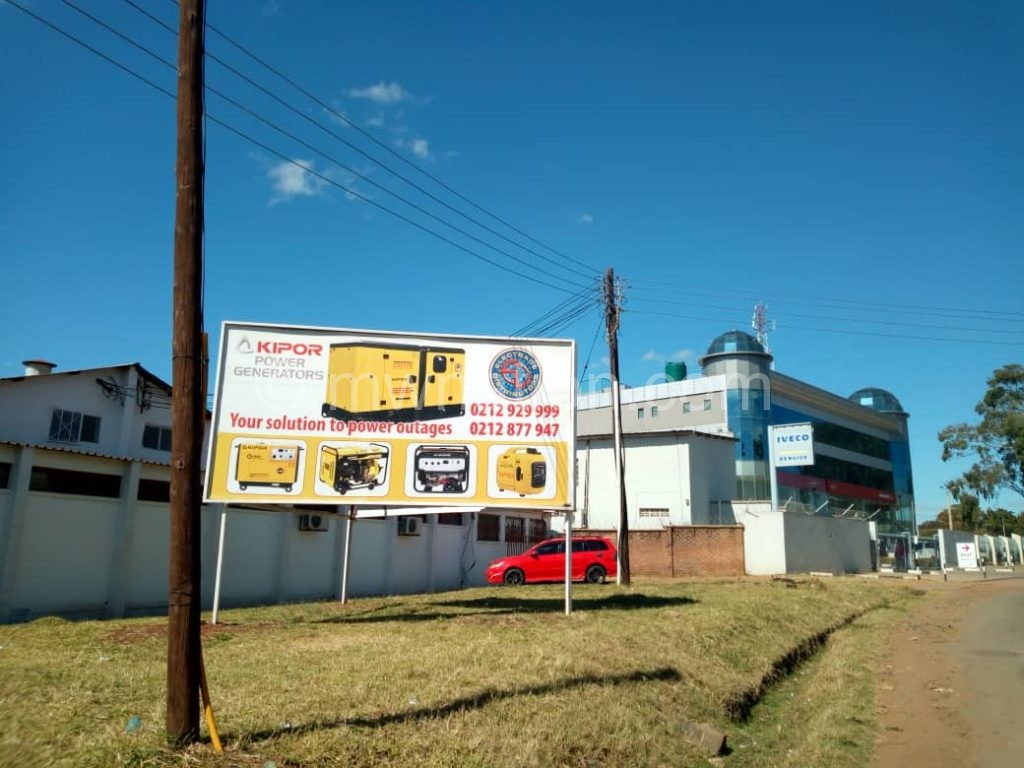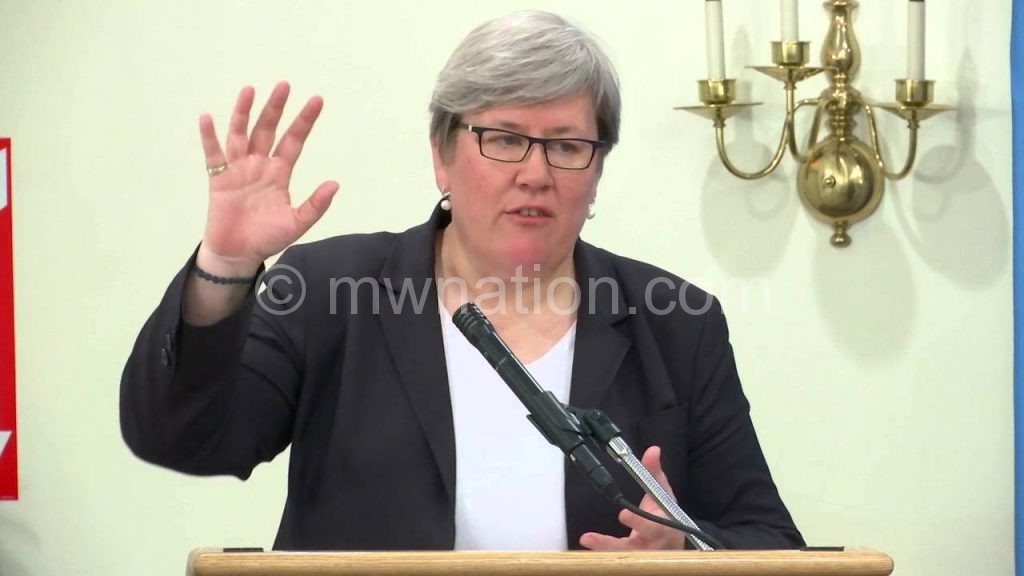A city trembling to diesel gensets
When power flickers off, a din of generators brings to light Malawi’s noisy race for unsustainable energy, writes our features editor JAMES CHAVULA.
It’s 6am, a chilly morning in Blantyre. Branching off Masauko Chipembere Highway into Salmin Armour Street, nosy passers-by instantly pick something amiss in the air seeping between Universal Industries and the glistening HTD glasshouse.

Sniff harder and you will realise that there are no sweet aromas of biscuits, crisps and crunches Universal Industries has been churning out for decades.
Instead, diesel fumes from a giant generator groaning to run the factory gush.
The pounding and turning of its pistons produce an earth-shaking hum that overpowers the purr of smaller generators in nearly every fence along the patched street.
The relentless roar is ear-splitting. Passers-by on the high-compunction tarmac in the semi-industrial zone quake in their shoes. The wall near the massive generator’s exhaust pipe is sooty and blackish, showing what the spurts of smoke can do to the environment. Another blackout likely to last over 12 hours!
But it is nothing strange.
Wednesdays have become difficult days at Ginnery Corner, where white-collar workplaces sit side-by-side with factories.
Sounds and fumes of a country battered by frequent and lengthy blackouts follow you every inch on the street named after former president of Zanzibar.
“Power generators: your solutions to power outages,” screams a strategically-placed billboard just opposite the biscuit factory whose emissions contribute to the smell of burning tyres in the air.
The deafening soundtrack and foul-smelling fumes speak of the noisy solution to Malawi’s persistent energy problems.
President Peter Mutharika blames the crisis on State failure to invest in expanding the grid which derives nearly all its power from the Shire River whose water levels are falling as drought in southern Africa persist and siltation from heavily deforested banks worsens.
“Let us be honest to admit that we did not invest to expand our energy generation. For 50 years, we kept thinking as if Malawi would remain what it was in the1960s,” said Mutharika in November at the peak of blackouts last year.
The population has risen from 3.9 million to 17.7 million since 1964.
However, power generation has slumped from about 350 megawatts (MW) to about 250MW since 2015.
This means more trouble for the economy as Electricity Supply Corporation of Malawi (Escom) rations power with no end in sight.
To fix the economy, the brains in the boardrooms of Escom and Electricity Generation Company (Egenco) have imported 75MW diesel-powered generators.
In January, Mutharika commissioned the electricity generators with an ambitious assurance that the end of the power halts had begun.
“Our dream is to end poverty and our main goal is to make Malawi a big economy,” he said. “But in order for us to develop our economy we need to have enough energy…and we need investors,” he said.

Five months on, the groaning generators on the street confirm that power problems persist, making the country hostile to existing and potential investors.
Only generators continue emitting fumes into the environment.
On Wednesdays, nearly every company along Salmin Amour Street runs on generators.
The din shifts to Blantyre central business district (CBD) on Thursdays.
In three-storey buildings in the CBD and Limbe, shoppers are haunted by the cacophony of generators from above and below, left and right, where they are going and where they are coming from.
It is like a contest to determine the firm with the largest machine or the capacity to run the longest. The grinding routine morphs into a din that leaves some passers-by poking their ears.
For those dying for calm in the noisy cities, there is nowhere to run.
Equally entrapped is the business sector for energy powers industries.
During the opening of the national trade fair last month Malawi Confederation of Chambers of Commerce and Industry (MCCCI) president Prince Kapondamgaga told Mutharika that the private sector was excited with a policy that requires independent power producers to sell electricity to Escom, but “progress seems to be very slow” due to lack of clarity on how they can get involved.
He stated: “As the country continues to experience power outages, use of alternative sources of energy such as diesel-powered generators have proven to be costly, pushing production costs upwards.
“Companies are now diverting a sizeable amount of their budget to finance generator sets and diesel while holding recruitment and salary increment plans at bay; hence, reducing the employment rates even further down.”
Malawi Energy Regulatory Authority (Mera) has approved three independent power producers, but none has rolled out.
Kapondamgaga wants the power deals “expedited, and not muffled” to make prevailing outages history once and for all.
But the ailing economy cries for power for industrialisation.
“What lies ahead? How long can we sustain the economy on generators,” asks Isaac Mwandira, from Chilobwe Township.
Random interviews in Limbe point to a telling forecast: The future looks bleak.
But the economy has been in this slowdown for a long haul, for a debate was settled five years ago that Escom can no longer claim to provide “power all day every day” when outages are not few.
Consumer rights activists successfully swayed the utility to stop deceiving the nation and sloganeering strategists devised a bizarre way to beat the backlash: they inserted ‘towards’ at the start of their motto.
But is it really pushing “towards power all day everyday”?
Malawians sick and tired of blackouts feel it is slipping backwards as power output wanes.
“The nation is slipping towards no power all day, every day,” says Michael Njewa, from Mbayani.
The situation was worse last year when chronic droughts in southern Africa left a hydropower dam in Tanzania running dry.
Shire slumped as well, halving Malawi’s power generation to about 150MW.
To close the gap, the country is rushing for fossil fuel just when the world is pushing towards clean, sustainable energy in line with Sustainable Development Goals (SDG7) adopted by Mutharika and other world leaders in 2015.
The President said the diesel-guzzling generators, which have driven up power tariffs, is a stop-gap to keep the economy going for two years.
He outlined permanent solutions, including the pending construction of the 300MW Chinese-funded coal-fired plant at Kamwamba Hill in Neno.

But Sustainable Energy for All chief executive officer Rachel Kyte warns against the seemingly cheap solutions to age-old power problems that slowly harm economies and the environment.
In an interview at the Sustainable Energy for All Forum in Portugal, she said: “It is no secret that there is a crisis of hydropower in Malawi and other southern African countries affected by drought. Some countries may believe diesel-generators and coal-fired plants are a cheap and quick way to close the energy gap, but they aren’t. In the long run, they are very expensive.
“The truth is that coal and diesel does not cut on the cost on human health, they don’t reduce air pollution and they won’t cut the cost of importing diesel on which most of the least developed countries adopting these unclean forms of energy have no say.”
Environmentalists classify coal and oil as unclean energy, a setback to the global agenda to reduce carbon emissions and global temperatures embodied by the Paris Agreement.
Kyte urged governments in sub-Saharan Africa to ensure every person accesses sustainable, reliable and affordable forms of energy by 2030.
She reckoned Malawi has the potential to join Kenya, Ethiopia, Rwanda and Senegal, which have lessened energy problems by integrating renewable energy to the national grids.
“Renewable energy in many countries is as cheap as traditional forms of energy, if not cheaper. It can be put in the grid and off-grid. Bringing renewable energy to the national grid makes the grid cleaner reliable. We are talking about less air pollution, less damage to crops and better lives for people. However, Malawi is sitting on renewable resources, especially wind and solar, which is cheaper than the cost of dispatching coal and oil,” she argued.
Last week, United Nations Industrial Development Organisation (Unido) Director General Li Yong called for increased access to clean energy and accelerated green industrial development to deliver sustainable and resilient societies.
In May, Unido brought together nearly 430 experts at the Vienna Energy Forum to discuss SDG7.
They restated the need for countries to dramatically reduce the greenhouse gas emissions from industry by increasing energy efficiency and switching from fossil fuels to alternatives.
“At the same time, industry is an important driver in the development of technical solutions and business models in the field of renewable energies and other clean technologies that support the implementation of SDG 7,” says Lin.
When power flickers off, the generators bring power to the city—and noise pollution.
This heralds a familiar foe to their businesses: skyrocketing costs of undesirable energy.
The smoky energy erodes profits and investors’ confidence just when the country envisages becoming “the preferred business destination”.
“The only one cashing in on blackouts are sellers of generators,” says a watch repairer in Limbe. “When I knock off in the evening, my eyes are itchy and red with smoke; ears cannot hear and headaches and coughs trouble me.” n





